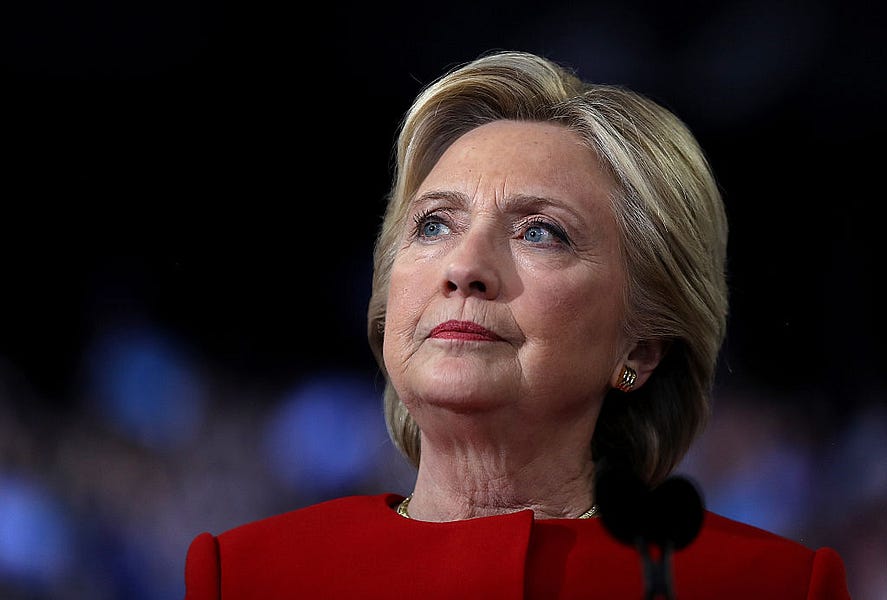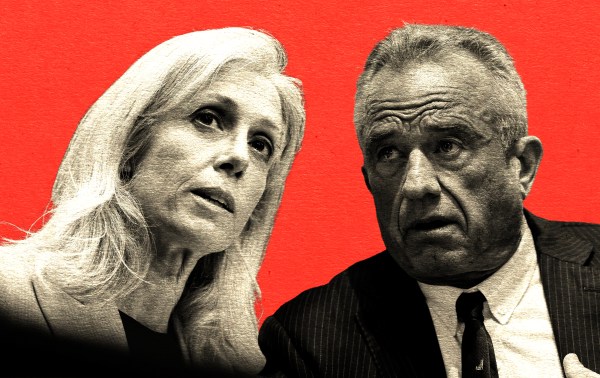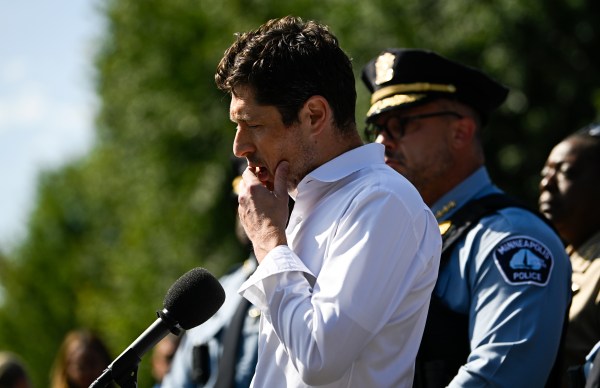On Friday a federal magistrate judge unsealed the warrant for Mar-a-Lago, former president Donald Trump’s Florida home, which was searched by FBI agents last week. According to the warrant, the FBI was looking for evidence of crimes related to obstruction of justice, removal of official records, and the mishandling of information relating to the national defense.
I must confess, the search warrant gave me déjà vu.
On July 5, 2016, FBI director James Comey issued one of the most consequential statements in federal law enforcement history. He explained precisely why the FBI did not recommend criminal charges against Hillary Clinton for mishandling “defense information,” some of which was classified at the highest levels of secrecy.
That statement not only influenced the outcome of a presidential election, its legal, political, and cultural consequences hover over American life. Nobody who’s evaluating Donald Trump’s conduct should forget Comey’s statement, and its standards should govern us today.
The reason why relates to a fundamental conception of justice itself—that similarly situated people should be treated similarly. For example, if two men commit an identical crime, and one receives twice the punishment of the other, that disparity rightly violates our sense of justice and fairness even if the disparate sentences are technically legal (such as within a statutory sentencing range).
Here we have two people at the apex of American politics: one a former secretary of state and then-presumptive Democratic nominee for president, the other a former president and now-frontrunner for the Republican nomination. Both of them possessed immense classification authority (by executive order, Clinton had power to classify and declassify State Department information up to the “top secret” level; as president, Trump possessed even greater authority). Both Clinton and Trump’s conduct implicated the same statute, 18 U.S.C Section 793.
That statute imposes substantial criminal penalties on anyone who “willfully” or through “gross negligence” removes national defense information from its proper place of custody. It also imposes criminal penalties on anyone who “willfully” retains national defense information in an improper location and “fails to deliver it” to an “officer or employee of the United States entitled to receive it.”
To understand the content and context of Comey’s statement, it’s necessary to walk back down memory lane and understand the essence of the Clinton email controversy. While the details are complicated, the basic story is simple. As Comey described it, Clinton set up and used “several different [private] servers and administrators of those servers during her four years at the State Department, and used numerous mobile devices to view and send e-mail on that personal domain.”
In plain English, this means that Clinton decided not to use government systems for a substantial part of her official email communications. That decision, by itself, was troublesome but not necessarily disqualifying. Public officials have frequently used private email for official business—sometimes because of convenience and sometimes because of technical challenges using official systems.
The real problem, however—the problem that implicated 18 U.S.C. Section 793—was that a number of the emails contained highly-classified information. As Comey noted, seven email chains concern matters that were classified at the Top Secret/Special Access Program level when they were sent and received. These chains involved Secretary Clinton both sending emails about those matters and receiving emails from others about the same matters.”
Comey also said that “any reasonable person in Secretary Clinton’s position, or in the position of those government employees with whom she was corresponding about these matters, should have known that an unclassified system was no place for that conversation.”
(This is one reason why the “but her emails” mantra from online progressives is so grating. What she did was serious, and pretending it wasn’t insults our intelligence.)
So why didn’t the FBI recommend charges? Here’s the key paragraph:
In looking back at our investigations into mishandling or removal of classified information, we cannot find a case that would support bringing criminal charges on these facts. All the cases prosecuted involved some combination of: clearly intentional and willful mishandling of classified information; or vast quantities of materials exposed in such a way as to support an inference of intentional misconduct; or indications of disloyalty to the United States; or efforts to obstruct justice. We do not see those things here.
I did not agree with this decision, and I said so in National Review and the New York Times. The problem is that Comey added elements to the statute. He essentially read “gross negligence” as a synonym for willfulness and added additional factors (such as obstruction of justice) to the prosecution decision.
If I had engaged in similar conduct when I was in the military, I would not have enjoyed the same level of deference. I would have been prosecuted, and I would have deserved prosecution.
But we can’t rewind the clock. We can only decide how to go forward. And so the DOJ should go forward with the same rule it applied to Hillary Clinton, including the same level of deference. Any other result wouldn’t simply be unjust—insofar as it would refuse to treat similarly-situated people similarly—it would be profoundly destabilizing. There cannot be one set of standards for Democrats and another for Republicans.
Would applying this same standard mean Trump, too, should not face prosecution? Well, not necessarily. We can’t yet conclude that Trump and Clinton’s misconduct is equivalent, and the reason why may relate not to the mishandling of defense information, but rather to obstruction of justice.
The available reporting indicates that Trump didn’t simply remove clearly marked classified material from the White House, he also retained much of that material in spite of repeated requests that it be returned, retained some of that material in defiance of a subpoena, and then ultimately treated the material as his personal property. Here’s Maggie Haberman, Glenn Thrush, and Charlie Savage, writing in the New York Times:
It is not clear why Mr. Trump apparently chose to hang onto materials that would ignite another legal firestorm around him. But last year, he told close associates that he regarded some presidential documents as his own personal property. When speaking about his friendly correspondence with the North Korean leader Kim Jong-un, Mr. Trump said, “They’re mine,” according to a person familiar with the exchange.
Moreover, there’s additional reporting that Trump’s team may have misled the DOJ. Yesterday morning, Maggie Haberman and Glenn Thrush reported that a “lawyer for former President Donald J. Trump signed a written statement in June asserting that all material marked as classified and held in boxes in a storage area at Mr. Trump’s Mar-a-Lago residence and club had been returned to the government.”
This misstatement could help explain why the Trump search warrant stated that it was seeking evidence of items “illegally possessed” in violation of both 18 U.S.C. Section 1519 and 18 U.S.C. Section 2071. Section 2071 prohibits removal, concealment, or destruction of federal records generally, while Section 1519 is an obstruction of justice statute. It imposes up to 20 years of imprisonment for any person who:
knowingly alters, destroys, mutilates, conceals, covers up, falsifies, or makes a false entry in any record, document, or tangible object with the intent to impede, obstruct, or influence the investigation or proper administration of any matter within the jurisdiction of any department or agency of the United States or any case filed under title 11, or in relation to or contemplation of any such matter or case.
In fact, the listing of Section 1519 on the warrant reminds me of the old adage: It’s not the crime; it’s the cover-up.
Trump lacks any real excuse for his behavior for retaining classified information, but Clinton had no excuse either. Remember, she used a private server to discuss matters that were classified at the highest levels, and she was seasoned enough to know exactly what she was doing.
Trump’s defense is as weak as Hillary’s. His team is reportedly claiming that he had a “standing order” to declassify all documents that he took to Mar-a-Lago, but as Philip Klein notes in National Review, this argument is “patently absurd”:
Consider all the times that Trump was at Mar-a-Lago during his presidency and worked out of there. Are we to believe that each and every document he brought with him there, no matter how sensitive, was immediately declassified and thus widely available for people to see?
Moreover, where is the documentary evidence for such an order? Declassification isn’t a mere mental process. So far there is more concrete evidence that Michael Scott declared bankruptcy than there is that Donald Trump declassified the top secret documents he held at Mar-a-Lago.
If Trump went beyond Clinton in his effort to conceal and cover up his misdeeds, including defying a subpoena and falsely asserting he’d turned over all the classified information in his possession, then he may face criminal consequences for obstruction even if his initial misconduct wasn’t materially different from Clinton’s.
The bottom line is deeply disheartening. Two of the most powerful and prominent politicians in the United States engaged in conduct that virtually any other American would be prosecuted for. They have placed the system under great strain, and the system is buckling.
It remains to be seen whether Donald Trump’s conduct was so much worse than Hillary Clinton’s that prosecution is both legal and just. Indeed the entire issue may be so fraught with peril that the DOJ may decide to merely seize the documents without any further legal proceedings.
But if Trump did break the law and is not prosecuted, we can look back at a pivotal moment in history and know why. On July 5, 2016, the FBI set an extraordinary standard for prosecuting powerful people for mishandling our nation’s most precious secrets, and we shouldn’t change that standard for Donald Trump.
One more thing …
Last summer I had the honor of speaking from the main stage at Chautauqua, New York. It’s a beautiful place, and it feels like a land that time forgot. I had a great time speaking and an even better time talking to Chautauquans at dinner and on their front porches.
It’s hard to imagine violence in such a lovely place, but that’s exactly where a knife-wielding assassin attacked Salman Rushdie on Thursday. Rushdie, you might remember, has faced threats on his life ever since he published The Satanic Verses in 1988. And now he’s in critical condition, clinging to life in a Pennsylvania hospital.
I try very hard to engage ideas—even extreme ideas—in good faith. I’ve always had a hard time engaging with the idea that “words are violence.” Words are not violence. Words never put a man on a ventilator.
And another thing …
In this week’s Good Faith podcast, Curtis and I talked about what it means to face uncertainty and turmoil with faith, not fear. It featured a conversation about stoicism, Rudyard Kipling’s legendary poem “If,” and Psalm 46. It’s a great discussion, and Curtis has some excellent thoughts.
One last thing …
Speaking of Psalm 46, I love the power of this hymn, based on the words of the psalm. It communicates that our confidence is rooted in God’s strength, not our own.







Please note that we at The Dispatch hold ourselves, our work, and our commenters to a higher standard than other places on the internet. We welcome comments that foster genuine debate or discussion—including comments critical of us or our work—but responses that include ad hominem attacks on fellow Dispatch members or are intended to stoke fear and anger may be moderated.
With your membership, you only have the ability to comment on The Morning Dispatch articles. Consider upgrading to join the conversation everywhere.